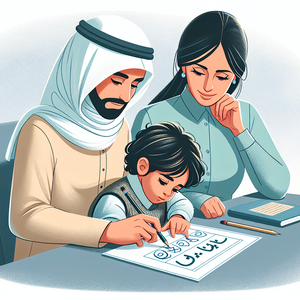Building Bridges Between Generations: Engaging Conversations About Faith and Morality Through Technology

Intergenerational dialogue is essential in fostering understanding and empathy among family members of different ages. Each generation grapples with unique challenges and perspectives, making it crucial to share beliefs and experiences to create a rich tapestry of insight. Engaging in conversations about faith and morality not only strengthens familial bonds but also enables children to develop a nuanced understanding of their beliefs. By utilizing technology, families can connect and share their perspectives, regardless of physical distance or busy schedules. The process of discussing faith and morality can be particularly important for younger generations, who are often bombarded with diverse viewpoints from social media and peer interactions. These conversations can help ground them in their family values while also encouraging critical thinking and personal growth.
Embracing Technology for Connection
1. Video Calls as a Conversation Starter: Video calls have become a staple in family communication, especially in an age where physical visits may be limited. Families can schedule regular video chats to discuss topics of faith and morality. For instance, a family could dedicate one call a month to explore a specific moral question or share personal stories related to their beliefs. This format allows for face-to-face interaction, fostering a sense of closeness and encouraging candid discussions. Tools such as Zoom, Skype, or FaceTime can facilitate these interactions, making it easy for families to connect regardless of geographical barriers. 2. Online Resources and Platforms: The internet is a treasure trove of resources that families can harness to facilitate discussions. Websites, podcasts, and online forums dedicated to faith and morality can serve as springboards for conversation. Parents can curate a list of articles, videos, or podcasts that resonate with their family’s beliefs, encouraging all members to share their thoughts and reflections on the content. Websites like YouTube offer a wealth of educational videos that can spark engaging discussions among family members. For instance, a family might find a documentary that explores moral dilemmas faced by historical figures, providing a rich context for discussion. 3. Social Media as a Tool for Sharing: Social media platforms can also play a role in bridging generational gaps in discussions about faith. Families can create private groups or pages where members can share inspirational quotes, articles, or personal stories related to their beliefs. This not only keeps the conversation alive but also allows for asynchronous communication, giving family members time to reflect and respond thoughtfully. Platforms like Facebook or WhatsApp can facilitate these exchanges in a comfortable environment, encouraging participation from all family members.
Creating an Environment of Openness
For family members to engage meaningfully in discussions about faith and morality, it's essential to cultivate an environment of openness and trust. Here are some practical tips: - Encourage Questions: Allow children to ask questions without fear of judgment. This can be facilitated through prompts during conversations, such as, “What do you think about this topic?” or “Have you ever felt differently about this?” Encouraging curiosity can lead to deeper conversations. - Model Vulnerability: Adults should share their own uncertainties and experiences, demonstrating how to navigate beliefs and moral dilemmas. This transparency encourages children to express their thoughts and feelings, fostering a sense of safety. - Be Patient and Respectful: Recognize that differences in opinion are natural. Approach discussions with patience, respect, and a willingness to understand differing perspectives. This attitude not only enhances dialogue but also models respectful discourse for younger family members.
Supporting Examples
To illustrate the effectiveness of technology in fostering intergenerational dialogue, consider the story of the Johnson family. The Johnsons, spread across three states, found it challenging to maintain their connection. They began hosting bi-weekly video calls where each member would share a personal story related to a moral or faith lesson they had learned recently. This practice not only reinforced their family values but also deepened their understanding of one another’s experiences and beliefs. Similarly, the Williams family discovered a podcast that discussed ethical dilemmas from different faith perspectives. They decided to listen to episodes together during their weekly family dinners, using the content as a springboard for discussion. This routine not only enhanced their conversations but also provided a shared experience that all family members looked forward to. These examples demonstrate how technology can facilitate meaningful discussions, allowing families to explore their faith in an engaging manner.
In a world that often feels divided and disconnected, technology has the potential to unite families by bridging generational gaps in discussions about faith and morality. By embracing video calls, online resources, and social media, families can create spaces for meaningful conversations that foster understanding and empathy. As families navigate their beliefs together, they not only strengthen their bonds but also equip the younger generation with the tools to engage thoughtfully with their faith. Ultimately, the conversations sparked through technology can illuminate the path toward a more compassionate and understanding future, one dialogue at a time. By nurturing open communication, families can ensure that their values and beliefs are passed down through generations, creating a legacy of faith and moral integrity.
Family Engagement Specialist
Nonprofits, community centers, educational institutions
Core Responsibilities
Develop and implement programs that enhance family communication and engagement across generations.
Facilitate workshops and training sessions on using technology for family discussions about faith and ethics.
Collaborate with community organizations to promote intergenerational dialogue initiatives.
Required Skills
Strong interpersonal and communication skills, with experience in family counseling or social work.
Familiarity with digital tools and platforms that support family interactions.
Ability to create engaging content for diverse audiences.
Digital Content Creator (Faith-Based Focus)
Faith-based organizations, educational websites, media companies
Core Responsibilities
Produce multimedia content (videos, podcasts, articles) that explores faith and morality topics for families.
Curate and present resources that can facilitate discussions between generations.
Engage with audiences on social media to promote meaningful conversations about faith.
Required Skills
Proficiency in video editing, graphic design, and writing for digital platforms.
Understanding of faith-based topics and ability to communicate them effectively.
Experience with SEO and social media marketing to reach targeted audiences.
Online Community Manager
Nonprofits, religious organizations, online platforms
Core Responsibilities
Manage and cultivate online communities focused on faith and morality discussions.
Create and moderate content that encourages respectful and meaningful exchanges among members.
Organize virtual events and discussions to promote intergenerational engagement.
Required Skills
Excellent written and verbal communication skills, with experience in community engagement.
Knowledge of social media platforms and online community-building strategies.
Ability to navigate sensitive topics and maintain a supportive environment.
Family Technology Consultant
Private consulting firms, educational institutions, family service organizations
Core Responsibilities
Advise families on the best technological tools to facilitate communication and discussions about faith.
Provide training sessions on how to use video conferencing and social media for family engagement.
Assess family dynamics and recommend customized technology solutions to enhance dialogues.
Required Skills
Strong knowledge of current technology trends, especially in communication tools.
Experience in counseling or social work, with a focus on family dynamics.
Patience and ability to teach technology to users of varying skill levels.
Youth and Family Outreach Coordinator
Churches, youth organizations, community service agencies
Core Responsibilities
Develop outreach programs that connect families and youth with faith and morality discussions.
Organize events that promote intergenerational dialogue, utilizing technology to reach wider audiences.
Collaborate with schools and community centers to implement educational programs.
Required Skills
Strong project management skills and experience in program development.
Understanding of youth culture and family dynamics, particularly in relation to faith.
Ability to work collaboratively with diverse groups and stakeholders.


